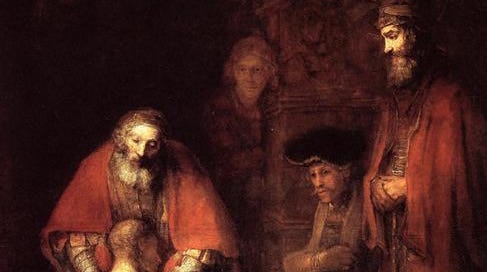Last night, I had a profoundly moving experience. Last September, a parishioner at Christ Church Cathedral where I am serving as the interim dean, asked if I would say a few words and then offer a prayer at a gathering of about 200 Houstonians to benefit wounded soldiers. I was honored to be asked and happy to accept.
But as the day got closer, I became concerned that I didn’t have the right words. I’ve read a good bit about PTSD, which is the focus of the Blue Angels Foundation, but I have never fought in a war. I am in awe of survivors and deeply grieved by those we have lost, but just pondering the struggles of returning, wounded soldiers can overwhelm me. I was beginning to feel mute and unworthy.
I went to bed still uncertain about what I would say last night. But I woke yesterday mysteriously thinking about the return of the prodigal son, which became the core of my remarks. The evening was even more moving than I had imagined it would be. Everyone had tears at one point or another. But this theme of coming home, which is the core of our practice here at Contemplative Chapel, seemed to resonate, even with the wounded soldier who spoke last night.
I offer these brief remarks here because they are really about much more than returning wounded soldiers. They are about all of us. God is our homeland, as Martin Laird says, and we all get to go there. Meanwhile, we hope we can manifest something of that divine homeland in our relationships with each other, with unqualified and unconditional love, forgiveness, and warm embrace. That is the work of God that we get to participate in. Here’s what I said at the Blue Angels fundraiser last night:
It is a distinct honor to offer the invocation this evening for such an important occasion. And I am enormously proud and comforted to see several friends from Christ Church Cathedral. I feel very much at home here in my new favorite city.
Earlier today, I attended the 30th anniversary celebration for New Hope Housing, an incredible ministry devoted to providing affordable homes for the poorest and most vulnerable in Houston. Then, yesterday, I met with Cathedral members planning the opening of a Respite Center for struggling immigrant families who are new to our country and trying to find a place, a ministry called Casa Mateo. And just the day before, I was with generous supporters of The Beacon, a ministry that serves as Houston’s “front door” for homeless people who are trying to find their way home.
All of these ministries are devoted to helping people find their way home. And now tonight: this extraordinary gathering devoted to helping wounded soldiers, our sons and daughters, find their way home, to health and wholeness, in a grateful nation. It’s the noblest of ministries that tends to the deepest human need and longing – the need and longing we all have to be home.
A great friend of mine who was a professor of Colonial American history at Princeton and who curated museums of colonial history in New England once told me that in the earliest days of colonial America, the homes of settlers were very simple and spare – there were few, if any, decorations, rarely much of anything on the walls, except maybe a crude map of the surrounding territory, this new place they hoped would be their home.
But if there was a work of art on the wall, by far my friend said that the most common piece of art in early Colonial America was a depiction of the Prodigal Son being welcomed home. Ever since my wife and I learned this, we have kept a depiction of this story by our front door, so that our children coming and going every day might somehow remember this core truth: that no matter what happens in their lives, they will always be welcomed home, with healing and warm embrace.
It's the oldest of stories, this story of longing for home. It’s the story of the Hebrew Bible, God promising a homeland for his people. It’s the story in the Gospel lesson appointed for this Sunday in many churches, Jesus going home to prepare a place for us. It’s the archetypal story of Odysseus making his way home from the Trojan war.
In other words, it is the deepest longing of the human heart that resounds throughout history, scripture, and literature. It is what soldiers protect for us, sometimes at the cost of their own lives, and it is something many of them know in their military unit – that they are at home there, too, with brothers and sisters who, they know, will lay down their lives for each other, as they seek to protect and defend us and our beloved homeland.
This is why I am so honored to join you tonight in this ministry of welcoming home our sons and daughters with warm embrace and the finest possible healing care. You are truly doing God’s work.
Let us pray: O Judge of the nations, we remember before you with grateful hearts the men and women of our country who in the day of decision ventured much for us, for our home, and for the liberties we now enjoy. Use us to show them that we and they are now truly home, in a place of healing, wholeness, and generous, warm embrace. In your holy name we pray. Amen.




Beautiful! I have had this longing in my own life, and I thank you for these words.
Dean Gary, thank you for posting this, so moving and beautifully written.
I am so proud to have you representing the Cathedral, and the Episcopal Church, giving comfort to so many. My thanks to the Wounded Warriors and the Blue Angels.